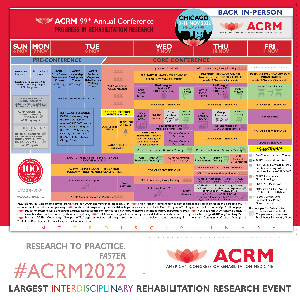Back
Aging Research & Geriatric Rehabilitation
Instrumental activities of daily living performance after working memory training
Wednesday, November 9, 2022
12:31 PM – 12:36 PM
Location: Station 2
- DL
Daniel A. Landinez, n/a
Assistant Professor - Researcher
Universidad Catolica Luis Amigo
Manizales, Caldas, Colombia
Presenting Author(s)
Research Objectives: To determine the effect of working memory training on instrumental activities of daily living
Design: Experimental study - Clinical trial with follow up after a month
Setting: Instituto Neurologico de Colombia
Participants: 32 ischemic stroke participants
Interventions: Experimental intervention: Software Braining administered during 12 weeks (three times a week). High level of difficulty
Active Control intervention: Software Braining administered during 12 weeks (three times a week). Low level of difficulty
Main Outcome Measures: Primary outcome: Instrumental activities of daily living
Secondary outcome: Working memory
Results: The active control group improved the capacity to use a telephone when comparing base line performance (2.0) (SD 2-3) to follow-up (3.0) (SD 3-3) d= 1,0.However the experimental group did not only improved the use of a telephone (2.0) (SD 2-3) to follow-up (3.0) (SD 3-3) d= 0.8 but also going out shopping (2.5) (SD 1-3) to follow-up (3.0) (SD 3-3) d= 0.6 and taking medications (2.0) (SD 1-2) to follow-up (3.0) (SD 2.7-3) d= 1.2
Conclusions: Instrumental activities can improve after working memory training however this far transfer effects can be improved by increasing the amount of training. On the other hand, this training is effective in ischemic stroke population and other populations should be assessed according to their particular features.
Author(s) Disclosures: None at this time
Design: Experimental study - Clinical trial with follow up after a month
Setting: Instituto Neurologico de Colombia
Participants: 32 ischemic stroke participants
Interventions: Experimental intervention: Software Braining administered during 12 weeks (three times a week). High level of difficulty
Active Control intervention: Software Braining administered during 12 weeks (three times a week). Low level of difficulty
Main Outcome Measures: Primary outcome: Instrumental activities of daily living
Secondary outcome: Working memory
Results: The active control group improved the capacity to use a telephone when comparing base line performance (2.0) (SD 2-3) to follow-up (3.0) (SD 3-3) d= 1,0.However the experimental group did not only improved the use of a telephone (2.0) (SD 2-3) to follow-up (3.0) (SD 3-3) d= 0.8 but also going out shopping (2.5) (SD 1-3) to follow-up (3.0) (SD 3-3) d= 0.6 and taking medications (2.0) (SD 1-2) to follow-up (3.0) (SD 2.7-3) d= 1.2
Conclusions: Instrumental activities can improve after working memory training however this far transfer effects can be improved by increasing the amount of training. On the other hand, this training is effective in ischemic stroke population and other populations should be assessed according to their particular features.
Author(s) Disclosures: None at this time
Learning Objectives:
- describe how working memory can predict instrumental activities of daily living performance
- demonstrate the effect of working memory training on instrumental activities of daily living
- explain the main flaws of working memory training

.jpg)
